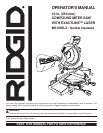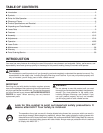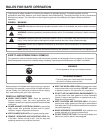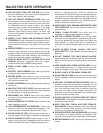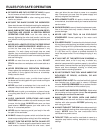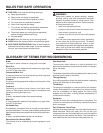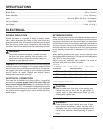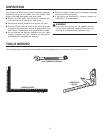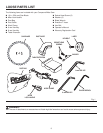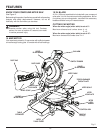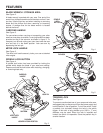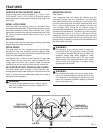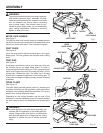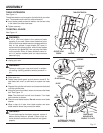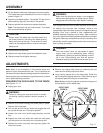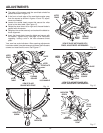
4
RULES FOR SAFE OPERATION
USE THE RIGHT TOOL FOR THE JOB. Do not force
the tool or attachment to do a job it was not designed for.
Use it only the way it was intended.
USE THE PROPER EXTENSION CORD. Make sure
your extension cord is in good condition. Use only a cord
heavy enough to carry the current your product will draw.
An undersized cord will cause a drop in line voltage
resulting in loss of power and overheating. A wire gage
size (A.W.G.) of at least 14 is recommended for an
extension cord 25 feet or less in length. If in doubt, use
the next heavier gage. The smaller the gage number, the
heavier the cord.
INSPECT TOOL CORDS AND EXTENSION CORDS
PERIODICALLY and, if damaged, have repaired at your
nearest authorized service center. Stay constantly aware
of cord location and keep it well away from the moving
blade.
DRESS PROPERLY. Do not wear loose clothing, gloves,
neckties, rings, bracelets, or other jewelry that can get
caught and draw you into moving parts. Nonslip footwear
is recommended. Also wear protective hair covering to
contain long hair.when used on another tool.
ALWAYS WEAR SAFETY GLASSES WITH SIDE
SHIELDS. Everyday eyeglasses have only impact-
resistant lenses; they are NOT safety glasses.
WEAR A DUST MASK to keep from inhaling fine
particles.
PROTECT YOUR HEARING. Wear hearing protection
during extended periods of operation.
SECURE WORK. Use clamps or a vise to hold work
when practical. It's safer than using your hand and frees
both hands to operate tool.
DO NOT OVERREACH. Keep proper footing and balance
at all times.
MAINTAIN TOOLS WITH CARE. Keep tools sharp and
clean for better and safer performance. Follow instructions
for lubricating and changing accessories.
DISCONNECT ALL TOOLS. When not in use, before
servicing, or when changing attachments, all tools should
be disconnected.
AVOID ACCIDENTAL STARTING. Be sure switch is off
when plugging in any tool.
USE RECOMMENDED ACCESSORIES. Consult the
operator's manual for recommended accessories. The
use of improper accessories may case risk of injury.
NEVER STAND ON TOOL. Serious injury could occur if
the tool is tipped or if the blade is unintentionally contacted.
CHECK DAMAGED PARTS. Before using the tool, a
guard or other part that is damaged should be carefully
checked to determine that it will operate properly and
perform its intended function. Check for alignment of
moving parts, binding of moving parts, breakage of parts,
mounting and any other conditions that may affect its
operation. A guard or other part that is damaged must be
properly repaired or replaced by an authorized service
center to avoid risk of personal injury.
NEVER LEAVE TOOL RUNNING UNATTENDED, TURN
THE POWER OFF. Do not leave tool until it comes to a
complete stop.
FIRMLY CLAMP OR BOLT your miter saw to a
workbench or table at approximately hip height.
USE ONLY CORRECT BLADES. Use the right blade
size, style and cutting speed for material and type of cut.
Do not use blades with incorrect size holes. Never use
blade washers or blade bolts that are defective or
incorrect. The maximum blade capacity of your saw is 10
in.
KEEP BLADES CLEAN, SHARP, AND WITH
SUFFICIENT SET. Sharp blades minimize stalling and
kickback.
DO NOT REMOVE THE SAW'S BLADE GUARDS.
Never operate the saw with any guard or cover removed.
Make sure all guards are operating properly before each
use.
KEEP HANDS AWAY FROM CUTTING AREA. Do not
reach underneath work or in blade cutting path with
hands and fingers for any reason. Always turn power off.
BLADE COASTS AFTER BEING TURNED OFF.
DO NOT ABUSE CORD. Never yank cord to disconnect
it from receptacle. Keep cord from heat, oil, and sharp
edges.
USE ONLY OUTDOOR EXTENSION CORDS. Use only
extension cords with the marking "Acceptable for use
with outdoor appliances; store cords indoors while not in
use". Use extension cords with an electrical rating not
less than the saw's rating. Always disconnect the
extension cord from the outlet before disconnecting the
product from the extension cord.
DO NOT USE TOOL IF SWITCH DOES NOT TURN IT
ON AND OFF. Have defective switches replaced by an
authorized service center.
KEEP TOOL DRY, CLEAN, AND FREE FROM OIL
AND GREASE. Always use a clean cloth when cleaning.
Never use brake fluids, gasoline, petroleum-based
products, or any solvents to clean tool.
ALWAYS SUPPORT LONG WORKPIECES while cutting
to minimize risk of blade pinching and kickback. Saw
may slip, walk or slide while cutting long or heavy boards.
BEFORE MAKING A CUT, be sure all adjustments are
secure.



